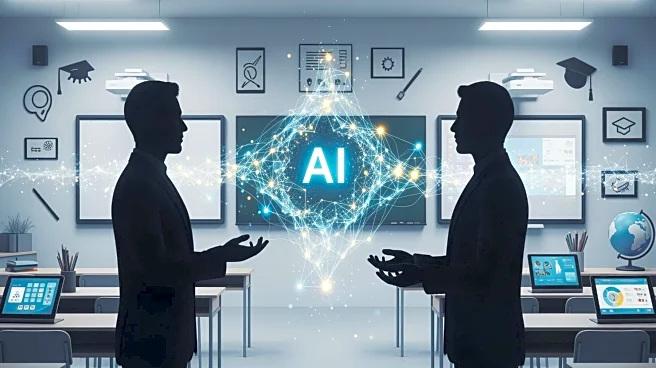What's Happening?
Washington state is pioneering the integration of artificial intelligence (AI) in educational settings through a new framework called 'Human-AI-Human' (H-AI-H). This initiative, led by the Office of Superintendent of Public Instruction (OSPI), aims to incorporate
AI as a tool to enhance educational processes. The framework involves human intervention at both the beginning and end of AI interactions, allowing students to use AI for information gathering and then critically analyze the results. Microsoft is collaborating with schools and colleges in Washington to explore AI applications, such as optimizing bus schedules and tailoring lesson plans. Despite the potential benefits, there are concerns about AI's impact on critical thinking and the risk of facilitating cheating. State Superintendent Chris Reykdal acknowledges these concerns but emphasizes the importance of embracing AI to avoid negative consequences of ignoring technological advancements.
Why It's Important?
The introduction of AI in education could significantly transform teaching and learning methods. By leveraging AI, educators can create more personalized and efficient educational experiences, potentially improving student outcomes. However, the integration of AI also raises ethical and practical concerns, such as the potential for reduced critical thinking skills and increased academic dishonesty. The framework's success could influence other states to adopt similar approaches, impacting educational policies nationwide. Stakeholders, including educators, parents, and policymakers, must navigate these challenges to ensure AI is used responsibly and effectively in education.
What's Next?
Washington's education leaders plan to continue developing AI-related courses and training for students, similar to existing computer science programs. The state aims to lead the nation in understanding AI's strengths and weaknesses, preparing students for a future where AI is ubiquitous. Ongoing collaboration with technology companies like Microsoft will be crucial in refining AI applications in education. As the framework is implemented, feedback from educators and students will be essential in addressing concerns and improving AI integration strategies.
Beyond the Headlines
The broader implications of AI in education extend beyond immediate classroom applications. The ethical considerations of AI use, such as data privacy and the potential for AI to influence student perceptions, require careful examination. Additionally, the lessons learned from the unregulated rise of social media highlight the need for proactive regulation and oversight of AI technologies. As AI becomes more ingrained in daily life, understanding its impact on mental health and social dynamics will be critical.

















